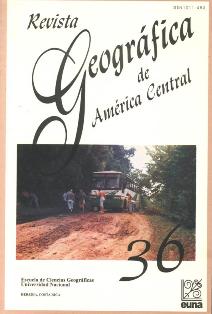PROPUESTA PARA LA ELABORACIÓN DE UN PLAN DE TRANSPORTE URBANO, DENTRO DEL CONTEXTO DE LOS PLANES REGULADORES EN COSTA RICA
Abstract
En este artículo se plantean los elementos fundamentales que deben contener un plan de transporte, dentro del contexto de los Planes Reguladores en Costa Rica
Se pretende que este documento sirva de guía metodológica en la elaboración de los planes reguladores, en la sección correspondiente al transporte y la vialidad. Actualmente existe un vacío teórico metodológico que se refleja en una ambigüedad conceptual y en una falta de rigurosidad metodológica, provocada por la interpretación que cada uno hace de las diferentes leyes de la planificación urbana que existen en nuestro país. Con el traspaso de los recursos obtenidos de la ley de bienes inmuebles a las municipalidades, se hace imperativo que la mayoría de las municipalidades, que no han elaborado un plan regulador, se aboquen a hacerlo y que numerosos consultores privados e institutos y escuelas universitarias ofrezcan esos servicios.
El trabajo recoge la experiencia de varios años de investigación en ese campo y la participación en numerosos congresos y conferencias a nivel nacional e internacional.
ABSTRACT:
This article dcals with the principal elements which a transportation plan should contain, within the context of regulatory plan in Costa Rica.
It is hoped that thís document wilI gcncrally serve as a methological guide for the design of thosc rcgulatory plans, and particulary with regard to the scction dealing with transportation and roadways.
There exists at prcsent a theoretical and methodological vacuum in this area which is reflected in a conceptual ambiguity and lack of methodological discipline, due to the various individual interpretations applied to ihose urban planning laws which do exist in this country.
Statutory revisions now prov ide for the allocation of proceeds from real property taxes to the municipalities, thus making it emperative that those local governments which have not done so, promptly design their own regulatory plan, and that public and private consultants, as well as institutions of learning and research, offer their specialized expertise to this effort.
Morever, this anide presents the results of many years of research in Ihis area in addition to the lessons learned from a continuing participation in conferences, seminars and events of a similar nature, heid at both national and international leveis.
Downloads
How to Cite
Issue
Section
License
Proposed policy for journals offering Open Access
Authors publishing their works in the Journal acknowledge and agree to the following terms:
a) Authors retain the copyrights to their works and guarantee the Journal the right to be the first to publish their works, under the Creative Commons License Attribution-NonCommercial-ShareAlike 4.0 International, CC BY-NC-SA 4.0 International (https://creativecommons.org/licenses/by-nc-sa/4.0/deed.es), which allows others to share works upon complying with the acknowledgment of authorship and mention of the Journal as the original publisher of the work.
b) Authors are permitted to separately establish additional agreements for the non-exclusive distribution of the official edition of the work published in the Journal (for example, authors may desire to place the work in an institutional repository or incorporate it into a book that is to published elsewhere) so long they acknowledgment to recognize the Journal as the original publisher. The aforementioned additional agreements must respect the terms of the non-profit character and sharing philosophy of the original license (CC BY-NC-SA 4.0 International, https://creativecommons.org/licenses/by-nc-sa/4.0/deed.es).
c) Authors are encouraged to archive the post-print or editor/PDF version in Open Access repositories.






 REVGEO is licensed under https://creativecommons.org/licenses/by-nc-sa/4.0/deed.es
REVGEO is licensed under https://creativecommons.org/licenses/by-nc-sa/4.0/deed.es
.svg_4.png)

_(1).png)
_(1)_(1)_(1)_1.png)
(2)(1)(1)(1).png)
